
Theoretical Economics
Scope & Guideline
Transforming Ideas into Economic Insights
Introduction
Aims and Scopes
- Economic Modeling and Game Theory:
The journal places a strong emphasis on the development of economic models and game-theoretic approaches. This includes analyzing strategic behavior in oligopolies, auctions, and markets with asymmetric information. - Market Structures and Competition:
Research often focuses on the dynamics of competition in various market structures, such as oligopolies and monopolistic markets, exploring themes like collusion, product differentiation, and pricing strategies. - Behavioral Economics and Preferences:
The journal incorporates insights from behavioral economics, examining how preferences, biases, and decision-making processes affect economic outcomes. This includes studies on time-inconsistent preferences and social considerations. - Public Policy and Regulation:
A significant focus is placed on the implications of economic theories for public policy, including regulatory frameworks, environmental policies, and corporate social responsibility. - Network Economics and Externalities:
Research in this area investigates the role of networks in economic interactions, including the impact of externalities on market behavior and the strategic adoption of technologies.
Trending and Emerging
- Strategic Corporate Social Responsibility (CSR):
Recent papers highlight the strategic dimensions of CSR, focusing on how firms adopt CSR practices within competitive contexts, particularly regarding environmental sustainability and stakeholder engagement. - Behavioral Insights in Economic Decision-Making:
There is an increasing trend towards incorporating behavioral insights into economic models, examining how psychological factors influence preferences, risk perceptions, and strategic interactions. - Dynamic and Networked Economic Models:
Emerging themes include the analysis of dynamic models that incorporate network effects and externalities, reflecting the interconnectedness of modern economies and the implications for policy and strategy. - Technology Adoption and Innovation:
Research on technology adoption, particularly in the context of negative external effects and competitive environments, is gaining traction as economies increasingly face challenges related to innovation and digital transformation. - Complexity in Economic Interactions:
The journal is increasingly publishing studies that explore the complexity of economic interactions through advanced models, including those that consider unawareness, multiple equilibria, and strategic delegation.
Declining or Waning
- Traditional Macroeconomic Models:
There has been a noticeable decline in the focus on traditional macroeconomic frameworks, such as those centered solely on aggregate supply and demand, as newer models incorporating microfoundations and behavioral aspects gain traction. - Simplistic Views of Rationality:
Papers that adhere strictly to classical assumptions of rational behavior are becoming less common, as the field shifts towards more nuanced understandings of decision-making that incorporate bounded rationality and cognitive biases. - Static Analysis of Economic Equilibria:
The emphasis on static models of equilibrium analysis has waned, with a growing preference for dynamic models that account for time, uncertainty, and strategic interactions over time. - Narrow Focus on Classical Welfare Economics:
Research concentrating solely on classical welfare economics, without considering broader social implications or behavioral aspects, is appearing less frequently, reflecting a broader trend towards integrating social efficiency and equity concerns.
Similar Journals
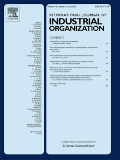
INTERNATIONAL JOURNAL OF INDUSTRIAL ORGANIZATION
Connecting theory and practice in the realm of industrial organization.INTERNATIONAL JOURNAL OF INDUSTRIAL ORGANIZATION, published by ELSEVIER, stands as a significant contributor to the fields of industrial organization, economics, and related disciplines. Since its inception in 1983, this peer-reviewed journal has focused on the interplay between organizational structures and market dynamics, delivering critical insights that propel academic and professional discussions. With an impressive scope covering topics from industrial relations to manufacturing engineering, it has carved out a niche as a vital resource for researchers, academics, and practitioners. The journal enjoys a strong reputation, evidenced by its Q1 ranking across multiple categories in 2023, including Aerospace Engineering, Economics, and Strategy and Management, confirming its relevance and impact within the academic community. Furthermore, the journal's rankings on Scopus highlight its influence, particularly in the realms of Industrial Relations and Economics. While primarily subscription-based, the wealth of information and the rigor of the published studies make it indispensable for those keen on advancing knowledge in industrial organization and its multifaceted applications.
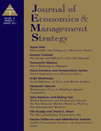
JOURNAL OF ECONOMICS & MANAGEMENT STRATEGY
Unlocking insights for strategic decision-making in a dynamic world.JOURNAL OF ECONOMICS & MANAGEMENT STRATEGY, published by Wiley, is a premier academic journal dedicated to advancing research in the interdisciplinary fields of economics, management, and strategic decision-making. Established in 1992 and continuing through 2024, the journal has garnered a reputation for critical analysis and innovative ideas, achieving a prestigious Q1 ranking in Business, Management and Accounting, alongside reputable Q2 rankings in Economics and Econometrics, Management of Technology and Innovation, and Strategy and Management categories. With an ISSN of 1058-6407 and an E-ISSN of 1530-9134, it serves as an essential resource for researchers, professionals, and students keen on exploring the latest trends and empirical studies impacting the fields of management and economic strategy. Although it does not currently offer open access, the journal’s rigorous peer-review process ensures that only high-quality research is published, providing valuable insights that shape real-world practices. Located in the United Kingdom and serving a global audience, this journal plays a vital role in fostering dialogue between academia and industry, highlighting its significance in the ever-evolving landscape of business strategy.
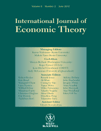
International Journal of Economic Theory
Navigating the forefront of theoretical economic analysis.International Journal of Economic Theory, published by Wiley, serves as a vital platform for scholars and researchers in the fields of economics and econometrics. With its ISSN 1742-7355 and E-ISSN 1742-7363, this journal focuses on advancing theoretical understandings in economics, providing a comprehensive analysis of contemporary economic issues. The journal has been converging knowledge and innovation since its inception in 2009 and continues to sustain a commitment to high-quality research until 2024. As a Q3 journal in the 2023 category rankings, it ranks in the 21st percentile in Scopus for Economics and Econometrics, reflecting its established presence amidst competitive scholarly discourse. Although it is not open access, the journal is widely accessible through institutional subscriptions, facilitating learning and research for professionals, graduate students, and academic leaders. The International Journal of Economic Theory is pivotal for those looking to contribute to economic thought, ensuring that emerging theories find a respected outlet in the global academic landscape.
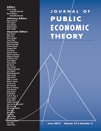
Journal of Public Economic Theory
Advancing Knowledge in Public Economic TheoryJournal of Public Economic Theory, published by WILEY, is an esteemed journal that focuses on the rigorous analysis and exploration of the theories and applications of public economics. With an ISSN of 1097-3923 and E-ISSN 1467-9779, this journal serves as a pivotal platform for researchers, professionals, and students engaged in economics, finance, sociology, and political science. Ranking in the prestigious Q1 and Q2 quartiles across various categories, including Economics and Econometrics as well as Sociology and Political Science, the journal is recognized for its significant contribution to the field. Its broad scope encompasses critical issues related to public policy, welfare economics, and fiscal policy, catering to an international audience. While the journal is not open access, its articles undergo a stringent peer-review process to ensure high-quality research dissemination. With a commitment to fostering scholarly dialogue and understanding, the Journal of Public Economic Theory remains an essential resource for those seeking to delve into the complexities of public economic issues, with a historical record of publication from 1999 to 2024.

Economic Theory Bulletin
Bridging theory and practice for a deeper understanding of economics.Welcome to the Economic Theory Bulletin, a premier journal dedicated to advancing the field of economic theory. Published by SPRINGER HEIDELBERG, this journal serves as a critical platform for researchers and professionals to disseminate innovative ideas and research findings that shape economic discourse. With an ISSN of 2196-1085 and an E-ISSN of 2196-1093, the Economic Theory Bulletin invites contributions that address theoretical advancements and empirical applications in economics, fostering insightful dialogue among scholars. Although the journal operates under a traditional access model, it remains committed to high-quality, peer-reviewed scholarship that meets the rigorous standards of the academic community. The diverse range of articles published here not only contributes to the theoretical foundations of economics but also emphasizes real-world applications, making it an essential resource for students and professionals alike. The journal’s impact on the evolving landscape of economic theory ensures that it remains a vital reference point for the latest research and trends in the field.
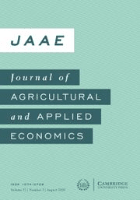
Journal of Agricultural and Applied Economics
Exploring innovative solutions for global food security.The Journal of Agricultural and Applied Economics, published by Cambridge University Press, stands as a leading platform for disseminating innovative research in the fields of agriculture, economics, and applied sciences. With an impressive impact factor and a prestigious Q1 ranking in Agricultural and Biological Sciences and Q2 in Economics, this journal is recognized for its rigorous peer-reviewed content that addresses contemporary challenges in agricultural and economic policies. Since its transition to Open Access in 2015, it has widened its reach, allowing scholars, practitioners, and students unrestricted access to vital research findings. The journal's scope encompasses a wide array of topics, fostering interdisciplinary dialogue and offering insights essential for informed decision-making in the agricultural sector. Addressing critical issues from food security to sustainable practices, the Journal of Agricultural and Applied Economics is instrumental for anyone seeking to contribute to the advancement of knowledge in these pivotal areas.
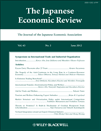
JAPANESE ECONOMIC REVIEW
Advancing insights into Japan's economic landscape.Japanese Economic Review, published by Springer Heidelberg, is a renowned academic journal that aims to advance the understanding of economic processes within the context of Japan and the Asia-Pacific region. With an ISSN of 1352-4739 and E-ISSN of 1468-5876, this journal features high-quality research articles that span a broad range of topics in economics and econometrics. Ranked in the Q2 category for Economics and Econometrics as of 2023, it holds a Scopus rank of #332 out of 716, placing it in the 53rd percentile among its peers. Although not Open Access, the journal invites contributions that provide insights and empirical analyses beneficial to both academics and practitioners. Emphasizing a deep understanding of economic dynamics, the Japanese Economic Review is essential reading for anyone interested in the implications of economic policies and trends, making it a significant platform for scholarly dialogue and research dissemination.

Economics of Governance
Shaping the Future of Governance through Economic Research.Economics of Governance (ISSN: 1435-6104; E-ISSN: 1435-8131) is a distinguished journal published by SPRINGER HEIDELBERG, dedicated to advancing the field of governance economics. Established in 2003, this journal explores the intricate relationships between governance structures and economic performance, making it a vital resource for researchers, practitioners, and policymakers alike. With its impressive categorization in Q3 in Business and International Management and Q2 in Economics, Econometrics, and Finance (miscellaneous) as of 2023, it stands as a prominent platform for innovative research. Although it operates without open access, it attracts a robust readership owing to its critical analyses and high-quality contributions, fostering an understanding of governance mechanisms in a globalized economy. The journal also receives recognition within Scopus, ranking #139 in General Economics and #323 in Business and International Management, reflecting its influence in shaping current discourse and research trends. For those devoted to the economics of governance, this journal is a crucial asset that continually encourages scholarly inquiry and professional development.
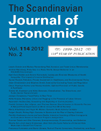
SCANDINAVIAN JOURNAL OF ECONOMICS
Unveiling the Dynamics of Economic ResearchSCANDINAVIAN JOURNAL OF ECONOMICS (ISSN: 0347-0520, E-ISSN: 1467-9442), published by Wiley, stands as a pivotal platform for disseminating research in the fields of economics and econometrics. With an impressive Q1 ranking in both disciplines, this journal plays a critical role in advancing theoretical and applied economic research, catering to an international audience of scholars, practitioners, and students. Its coverage from 1977 to 2024 demonstrates a robust commitment to publishing high-quality research that influences both policy-making and academic inquiry. Although it operates on a traditional subscription model, the journal remains accessible to a broad readership, which is essential for fostering knowledge sharing within the economics community. As such, the SCANDINAVIAN JOURNAL OF ECONOMICS is an essential resource for those seeking to explore the latest developments and methodologies in economic research, helping to bridge practical insights with academic rigor.

Review of Economic Design
Unveiling Cutting-Edge Research in Economics and Finance.Review of Economic Design, published by Springer Heidelberg, is a distinguished journal that serves as a vital platform for researchers in the field of economics, econometrics, and finance. Established in 1996, the journal focuses on the advancement and dissemination of economic designs and models, contributing innovative theoretical frameworks and empirical analyses that influence economic policy and practice. With a commendable Q2 category ranking in the 2023 quartiles for its field, it features rigorous peer-reviewed articles that cover a broad array of topics within economics. Although it currently does not offer open access options, the journal's commitment to academic excellence is reflected in its comprehensive and methodologically sound publications. Scholars and practitioners alike benefit from engaging with the cutting-edge research presented in this journal, which encompasses both foundational studies and contemporary issues shaping the economic landscape. For those keen to stay abreast of the latest developments, Review of Economic Design is an essential resource, promising insightful contributions through the year 2024 and beyond.